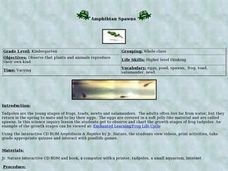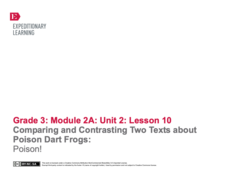Biology Junction
Amphibians
Biologists know of more than 2,300 living species of amphibians. Learn more about the four orders of amphibians with an interesting presentation. It explains the similarities and differences between the thousands of species of...
Omaha Zoo
Monitoring Amphibians
What sort of shoes do frogs wear? Open toad sandals. If your scholars want experience collecting field samples, this is the lesson for you. After learning the proper way to collect field samples, pupils catch amphibians to test for...
Purdue University
Reptiles, Amphibians, and the Scientific Method
What do a reptile and an amphibian have in common? A three-part lesson allows scholars to investigate the similarities and differences between the two types of animals by identifying specific body parts. The lesson highlights the...
Curated OER
Reptiles and Amphibians
Introduce your class to various reptiles and amphibians. They will meet and identify a representative from each of the four major reptile families, then learn about and discuss reptile characteristics. Next, they will identify and...
Curated OER
Reel in Learning with Reptiles
Whether it’s all about a Jackson Chameleon or a North American Bearded Lizard, learners will be eager to embark on informational text with reptiles.
Curated OER
Amphibians
In this amphibian worksheet, students read about the frog life cycle to complete the Venn diagram. They also answer 16 fill in the blank questions about frogs.
Curated OER
What Class Are You In?
Classifying animals has never been this much fun! Pupils discuss the animal groups, fish, reptiles, amphibians, mammals, birds, and also identify their characteristics. Then, they take pictures of animals and classify them in a group...
National Science Teachers Association
Hop into Action
Young scientists find out what makes amphibians such unique and interesting animals in this simple life science lesson. After looking at pictures and discussing the characteristics of amphibians, learners complete a series of three Venn...
Curated OER
Educator's Guide: Holes
You'll be a star at your next grade level meeting with an educational unit on Louis Sachar's Holes. Based on both the novel and film, the lessons include applications to language arts with character studies and movie reviews; social...
Curated OER
Reptiles and Amphibians
Fourth graders explore biology by viewing animal videos in class. In this amphibian and reptile instructional activity, 4th graders identify the key differences between reptiles, amphibians and other animal classifications. Students view...
Curated OER
Amphibian Spawns
Students observe tadpoles as they gradually change into adults. In this amphibian biology lesson, students watch tadpoles in a tank in the classroom, keep a daily record of what they observe, and chart the growth development of the...
Curated OER
Amphibians Internet Activity
In this amphibians worksheet, students click on the links in the questions about amphibians to find the answers to the questions and then come back and answer the questions. Students answer 10 questions total.
Curated OER
Addition with Regrouping
In this regrouping in addition worksheet, students use the table for the 'Threatened and Endangered Animals' and their numbers to solve the addition problems that utilize regrouping.
Curated OER
Do You Know How an Amphibian Grows?
In this amphibian growth instructional activity, students fill 5 blanks with the correct cut-and-paste image of the stages of growth from tadpole to adult frog. Students cut out each stage of growth and order them in the life cycle of a...
EngageNY
Comparing and Contrasting Two Texts about Poison Dart Frogs: Eggs and Tadpoles
Poison Dart Frog babies are the focus of a activity that challenges scholars to compare and contrast two informational texts. Beginning with a read-aloud, followed by a discussion, readers complete a practice page that examines the main...
EngageNY
Comparing and Contrasting Two Texts about Poison Dart Frogs: Poison!
Scholars compare and contrast two informational texts about Poison Dart Frogs. A brief vocabulary review and discussion lead the way to a two-part close reading—the first reading for gist the second reading for details. Followed by a...
Curated OER
The Five Classes of Vertebrates
What a terrific lesson plan! Learners discuss the animal kingdom, and classify them as vertebrates and invertebrates. They also identify them as fish, amphibians, reptiles, birds, and mammals. There is even a taxonomic breakdown of...
Curated OER
Who Am I?
Young biologists can see a variety of animals, amphibians, mammals, insects and clearly identify them. They match up the animals' names with the picture. The pictures are clear and colorful! A very nice worksheet for early elementary...
Curated OER
Who am I?
Here's a worksheet that has a variety of animals pictured. Learners must cut and paste the correct name and glue it in the box with the pictured animal. Great for young learners. An answer key is included on the worksheet.
Curated OER
Amphibians Crossword Puzzle
In this biology worksheet, students complete a crossword puzzle with 24 questions about different types of amphibians and functions of their body parts.
Curated OER
Leapin' Lizards And Other Facts About Reptiles And Amphibians
Students compare and contrast reptiles and amphibians. As a class, students discuss the yellow-spotted lizard mentioned in the novel Holes. Using internet resources, students research facts about reptiles and amphibians and document...
Curated OER
Amazing Amphibians- Reading Comprehension
In this amazing amphibians worksheet, students read a one page essay about the characteristics of amphibians. They answer 10 true and false questions based on the reading.
Curated OER
Amphibian Identification Exercise
Students are told that Idaho is home to many amphibians. They use the key to identify the species that are listed on the list. Students use the key to compare their species with the choices given and choose the option that best matches...
Curated OER
Prairie Scales and Prairie Smoothies
Sixth graders explore the animals that live on the prairie and identify differences between amphibians and reptiles and the adaptations each have made to live on the prairie.

























